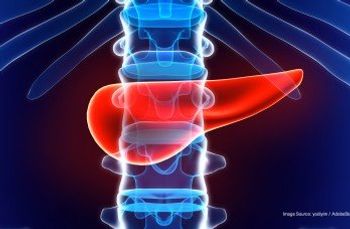
Durvalumab Combo Yields OS Benefit in Advanced Biliary Tract Cancer
The phase 3 TOPAZ-1 trial of durvalumab plus chemotherapy showed a significant benefit vs chemotherapy alone for patients with advanced biliary tract cancer.
A clinically meaningful long-term overall survival (OS) benefit at 3 years was observed when durvalumab (Imfinzi) was combined with standard-of-care chemotherapy for patients with advanced biliary tract cancer, according to results from the phase 3 TOPAZ-1 trial (NCT03875235).1
At a median follow-up of 41.3 months, the risk of death was reduced by 26% (HR, 0.74; 95% CI, 0.63-0.87) in the durvalumab arm (n = 341) vs chemotherapy-alone arm (n = 344). The median OS in the durvalumab arm was 12.9 months (95% CI, 11.6-14.1) vs 11.3 months (95% CI, 10.1-12.5) for chemotherapy alone. At 3 years, 14.6% of patients (95% CI, 11.0%-18.6%) were alive compared with 6.9% (95% CI, 4.5%-10.0%), respectively.
The press release noted that results from TOPAZ-1 are the longest survival follow-up for a global, randomized phase 3 trial in this patient population. Additional results will be reported on April 18, 2024, at the Cholangiocarcinoma Foundation Conference.
“TOPAZ-1 raised the bar for the treatment of advanced biliary tract cancer, showing a remarkable survival benefit for [durvalumab] added to chemotherapy with a well-tolerated regimen. These data represent the longest survival follow-up reported for immunotherapy in this setting, and the 3-year landmark survival improvement underscores our commitment to improving long-term outcomes in gastrointestinal cancers,” Susan Galbraith, executive vice president of Oncology R&D at AstraZeneca, said in the press release.
At the planned interim analysis in October 2021, the primary end point of OS was met.2 The risk of death was reduced by 20% with the doublet compared with chemotherapy alone (HR, 0.80; 95% CI, 0.66-0.97; 2-sided P = .021). At the time, there was an improvement in progression-free survival (PFS) and objective response rate (ORR).
Following a press release on these data, Galbraith said, “We are delighted TOPAZ-1 has been unblinded early due to clear evidence of efficacy for [durvalumab] plus chemotherapy, which has also demonstrated a strong safety profile…We believe the significant survival benefit demonstrated marks a new era of immunotherapy treatment in this devastating disease, and it advances our commitment to improving long-term survival for patients across these cancers where treatment options are limited.”
In the TOPAZ-1 trial, patients were given an intravenous infusion of durvalumab every 3 weeks plus gemcitabine and cisplatin for up to 8 cycles followed by durvalumab monotherapy every 4 weeks until disease progression or treatment discontinuation.3 The chemotherapy arm had matched dosing.
The primary end point assessed OS and then the OS rate at 18 and 24 months. Secondary end points included PFS, ORR, duration of response, and disease control rate.
Patients were eligible for treatment if they had histologically confirmed, unresectable advanced or metastatic biliary tract cancer including cholangiocarcinoma and gallbladder cancer. Additionally, patients with previously untreated disease that was unresectable or metastatic at initial diagnosis, recurrent disease more than 6 months after curative surgery, or more than 6 months after the completion of adjuvant therapy, and an ECOG performance status of 0 or 1 were eligible.
Patients were excluded from treatment if they had a history of another primary malignancy, brain metastases or spinal cord compression, uncontrolled intercurrent illness, major surgery within 28 days of starting treatment, or prior local-regional therapy.
“The latest data from TOPAZ-1 show that twice as many patients with advanced biliary tract cancer were still alive at 3 years with durvalumab and chemotherapy, an especially meaningful advance in a setting where historically the prognosis has been poor. These results reinforce the long-term benefit of this immunotherapy-based combination as a standard of care for patients with this devastating disease,” Do-Youn Oh, MD, PhD, professor in the Division of Medical Oncology in the Department of Internal Medicine at Seoul National University Hospital and Seoul National University College of Medicine, and principal investigator in the trial, said in the press release.
References
- Imfinzi plus chemotherapy doubled overall survival rate at three years for patients with advanced biliary tract cancer in TOPAZ-1 Phase III trial. News release. AstraZeneca. April 16, 2024. Accessed April 16, 2024. https://shorturl.at/hklJM
- Imfinzi plus chemotherapy significantly improved overall survival in 1st-line advanced biliary tract cancer in TOPAZ-1 Phase III trial at interim analysis. News release. AstraZeneca. October 25, 2021. Accessed April 16, 2024. https://shorturl.at/qtyS7
- Durvalumab or placebo in combination with gemcitabine/cisplatin in patients with 1st line advanced biliary tract cancer (TOPAZ-1) (TOPAZ-1). ClinicalTrials.gov. Accessed April 16, 2024. https://shorturl.at/hsNQ4
Newsletter
Stay up to date on recent advances in the multidisciplinary approach to cancer.












































